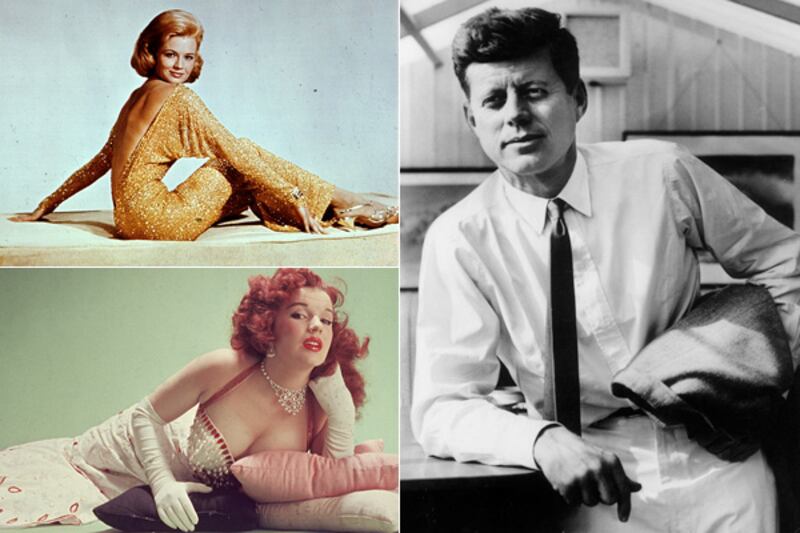Although it’s not yet noon, Mimi Alford has already been interrogated by one interviewer after another in a packed schedule of media appearances that started before dawn—and yet she gets more buoyant with every passing hour.
After half a century of silence, the 68-year-old woman who says she had a clandestine affair with President John F. Kennedy when she was a 19-year-old White House intern has finally told her story in a new memoir called Once Upon a Secret. She’s supposed to be weeping for the cameras and prostrating herself by now—but instead of seeming teary and abject, Alford looks as though she’s been unexpectedly ambushed by something strangely akin to joy. And no one is more surprised than she is.
“I feel as if I’m getting taller,” she marvels, gesturing toward the ceiling as though she were a helium balloon that’s expanding and tugging skyward. “I feel—bolstered up. This second step of talking, after the writing—it’s liberating. I have this feeling inside that I’ve just been freed from something. I’m being honest, and that’s why I feel good. Talking about it is really helping me; it’s making me feel whole. I feel like I was a puzzle, and there was a piece missing—and it’s put together now.”
The resulting picture has not pleased everyone. Struggling to conceal their frustration with unctuous doses of faux empathy, her questioners poke and prod, trying to wrest the predictable clichés from the patrician woman who keeps declining to follow the expected script.
Why isn’t Alford pretending she felt guilty about sleeping with Jacqueline Kennedy’s husband, even though she actually didn’t, or feigning regret for an adulterous relationship she doesn’t regret, even though it ruined her own marriage and blighted her life?
Why won’t she condemn JFK for taking her virginity as casually as he might have downed a canapé—let alone for commanding her, as she says, to perform oral sex on a White House aide while he watched? “There must have been some real demons” is all she can bring herself to say about that. Doesn’t Alford understand that contemporary pop culture expects her to whitewash the dark parts of her story so people can reassure themselves that life is as simple as they want it to be?

“I keep saying, ‘This is just my story,’” Alford says wryly. “But I’m getting the feeling that people think I set out to tarnish the president’s image. He was powerful. He was loved by so many. He died so tragically.”
She understands all that, but at times—particularly with female interviewers who can scarcely disguise their disapproval of Alford’s teenage transgression—she has to restrain herself from turning the tables. What she’d really like to do is ask them how they would have reacted if the youngest, most charismatic president in American history had offered them a private tour of the White House family quarters and suddenly started undressing them.
“I’m in the bedroom, he’s so handsome, I’m 19, and I’ve had two daiquiris,” Alford says dryly. “The president was an amazing man, just so charming. Do I know one person who would have done differently?”
She says her sexual initiation began on her fourth day as a White House intern with an invitation to swim in the pool where JFK exercised daily to ease his chronic back pain. The pool was as warm as a bathtub, but Alford was swimming with sharks; as a virgin whose previous sexual experience consisted of a single kiss in the eighth grade, she was stunningly unprepared to deal with an administration in which sacrificial maidens were apparently paraded before the president like unwitting lambs being led to slaughter.
And yet no matter how many times she’s challenged, Alford refuses to condemn JFK for appropriating her as a sexual plaything—or herself for acquiescing. “The 19-year-old Mimi—the truth is that she was OK with that,” Alford admits. “A lot of people at 19 do things that, when they’re 68, they look back and regret. But it’s not that I regret this. It’s more that I accept what I did—the positive and the negative. That’s hard for people to understand.”
Public disapproval isn’t unexpected, of course; history has been written by men for thousands of years, and women’s experiences were traditionally suppressed. Whenever women who have been involved with famous men come forward to tell their stories, there’s always a backlash from those who accuse them of attention-getting, money-grubbing, revenge-seeking, or other unseemly motives—all of which are now being hurled at Alford by countless critics on Internet comment threads.
But to her, telling her own story is the culmination of a lifelong journey that involved self-discovery as much as it did exposing her secrets to others. “People are sometimes afraid of openness. I don’t know why it scares people, but it did me,” she says. “Now I know all of me, and it’s not 100 percent perfect.”
That alone has taken her many decades to accept. “Before my mother died, she said, ‘Your father always used to say to me, “Why does Mimi feel she has to be so perfect?”’” reports Alford, who grew up in a Social Register family from New Jersey. “I was such a good girl; I did everything I was supposed to do, and I did everything well. Did I ever not get my homework done? Are you kidding? My younger sister was more rebellious, but I was pretty much the perfect one in the middle. Does a middle child need to be noticed?” She rolls her eyes.
Alford, whose name was Mimi Beardsley back then, had two older siblings and two younger ones, and she attributes some of her vulnerability as an adolescent to the thrill of being singled out when she arrived at the White House, where everyone seemed glamorous, sophisticated, and strangely willing to include her in the president’s inner circle. “Being part of it—that was huge, for me,” she acknowledges. “I was special; I was taken in. When I think about it, I go back to feeling sort of—chosen.”
Alford had struggled with a bout of anorexia at Miss Porter’s School, Jacqueline Kennedy’s alma mater, and—as the daughter of a manic-depressive father—she also had some daddy issues that may have made her particularly susceptible to JFK’s charms. “I didn’t know my father that well,” she admits. “I think my father paid more attention to my brothers.”
But until I ask, it has never occurred to her that the 45-year-old president might have represented a father figure to a teenager who says she did her homework in the limousine that fetched her from school to their assignations.
We are chatting over coffee in a midtown restaurant where Alford is accompanied by her second husband, Dick Alford, whom she married in 2005. “You say in the book that the president asked you about your grades and your classes, and he kidded you about going out with that boy from Penn,” Dick points out. “That’s sort of a fatherly thing to do.”
“I hadn’t thought about that,” Mimi says, looking startled.
Even now, it isn’t hard to understand why she caught the roving eye of the president of the United States. On television she comes off as the kind of well-bred WASP who has perfect posture, upper-class speech patterns, impeccably cut silver hair, and flatteringly understated makeup. But when she stands up—wrapped in a form-fitting navy bandage dress, her whippet-thin figure betraying nary an ounce of body fat—she looks as close to a supermodel as a senior citizen can get.
The first time Dick Alford met her, he says, “she was the most beautiful woman I’d ever seen.”
For Mimi, her happy second marriage has brought closure to a very unhappy saga. After she got involved with JFK, they continued to see each other for 18 months, until he was assassinated. By then she had met, fallen in love with, and become engaged to her first husband, Tony Fahnestock, who only learned about his fiancée’s illicit affair when JFK was killed and she fell apart. Fahnestock forbade her to talk about it ever again, with anyone, and they went ahead with the wedding they had planned. “Tony was so perfect on paper for me, and I’m sure there was the feeling that he was going to rescue me from the craziness,” she says.
Their marriage endured for 25 years, but it had already been poisoned. “Deep down inside, I think he was so hurt—I think that’s what it was. Tony was a very conscientious person, and he liked to be in control. He was scared when I would be emotional, so I didn’t do that; I did that on my own. Something really froze in me, and what really blighted the marriage is the shutting down,” Alford explains. “We didn’t know anything about getting help. If we’d talked to someone, it could have been really different. But it’s like a trauma, with a small ‘t.’ It’s not that it’s life-threatening, but it took a whole chunk away from me.”
The marriage ended with such bitterness that, she says, she was barred from attending Fahnestock’s funeral when he died, three years after their divorce, from lung cancer. “I got the message from his family through a mutual friend,” she says. “He had been my husband for 25 years; he was the father of my children—but I wasn’t allowed to go.”
In the years since, Alford has worked hard to excavate what she really feels. “People have said, ‘Why did it take you so long?’ Because I didn’t listen to myself,” she explains. “Tony said to me, ‘You’ve never known what you wanted,’ and that was true. Why did it take me so long? I think it’s being shut down at the time. Nobody ever said to me, ‘Is this the right thing for you?’ Nobody paid attention to me. Why was I so stuck? I didn’t have a voice. I don’t think I felt that I had options, at the White House or in life. That’s why I stayed so long in my marriage. It’s taken a lot for me to finally stand up, and that’s about feeling that you have a voice.”
And yet even now, she can’t bring herself to condemn the man who shaped her destiny. “There were times when I was writing the book when I did get angry at the president,” she says hesitantly. “This is going to sound strange, but I was angry at him for me not being able to stand up for myself. If I’d had experience with a boyfriend, with standing up for what I thought or wanted—but I didn’t have any of that.” She sighs. “But I just can’t blame him. I could blame the situation, the keeping of secrets, the shutting down—but I never blamed him.”
Now that she’s finally telling the truth, however, she admits, for the first time, something she has long denied, even to herself. “I used to think I wasn’t in love with him. I thought I loved being included, but it was more than that,” she says softly. “I did love him.”





